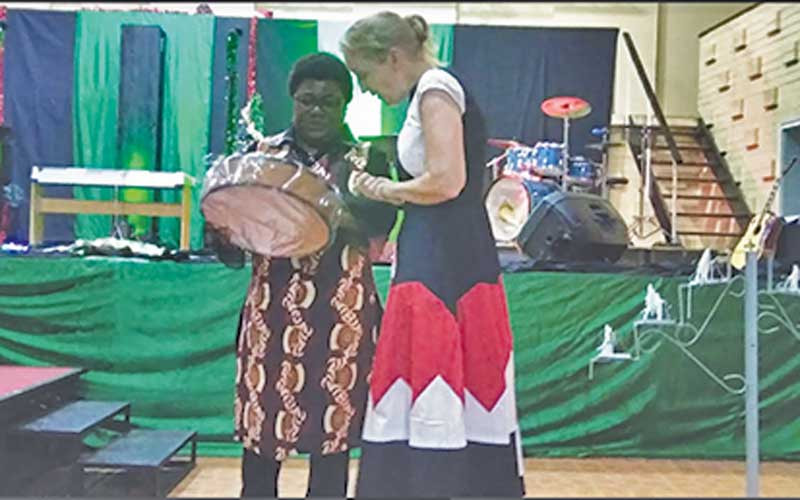
THE birth of Jesus has long been celebrated in song and Christmas carols are now just as a staple of the non-religious family festivity as much as the church’s celebration of the feast.
Some people and organisations host Christmas carol concerts as part of the festive season celebrations.
Zimbabwe College of Music (ZCM) last week, wrapped its semester with an end of year concert in the form of Christmas carols.
ZCM is one of the country’s leading formal music training institutions established in 1948 by a dedicated musician and teacher, Eileen Reynolds.
Among the institution’s graduates are Clive “Mono” Mukundu, Charles Charamba, Pamidzai Tracey “Pah Chihera” Mbirimi and Hope Masike.
Speaking to NewsDay Life & Style on the sidelines of the concert, ZCM’s executive director Rachel Jera-Chigwanda said: “Christmas season is such a special and wonderful time for many people so in line with that we decided to celebrate our end of year concert in the form of Christmas carols under the theme, Love, Joy and Care.”
“After struggling the whole year, you know, financial and economic challenges, we thought through the carol concert we should spread the word and teach people that we just need love, care and joy. If you have, just share with other people so that we are at the same level and love each other.”
Rebecca Archer-Knepper, the public diplomacy Officer at the US embassy in Harare, who was the guest of honour recognised the immense talent in the arts sector.
- Zengeza 2 High crowned music champs
- ZCM, leading beacon in arts sector growth: Jera-Chigwanda
- Terry Muzic drops single
- Christmas carols concert ends Zim College of Music year
Keep Reading
“I have been in Zimbabwe for almost a year and half and have been so impressed with the talent I have seen here. Embassy efforts and opportunities to strengthen the music industry for all those musicians and music lovers out there please do get in touch,” she said.
Archer-Knepper was given a Nyunga Nyuga mbira as a Christmas gift by the college. The Nyunga Nyunga mbira is a 15-Note kalimba (or lamellophone), named after the community in Manicaland from which it originated.
Jera-Chigwanda said ZCM had been key in producing talents that are making it big on the music stage.
On Friday, some of its students were performing at State House.
She said getting invitations for their students to perform at State functions was a recognition of the institution.
Although the college is still feeling the pinch and yet to fully recover from the effects of the global COVID-19 pandemic, Jera-Chigwanda is optimistic that 2024 will be a different year altogether.
“COVID-19 really put us down. For example, we had a class of 93 and after the pandemic that class had 17 students. So, three-quarters of the class dropped out not of their will, but because of economic challenges while some lost their key people who were looking after them or were responsible for paying their tuition,” she said.
“We have managed to push through, we are moving and trying our best. I see us just a step forward. Though we are not yet where we were, so roughly we are at least approaching 50% of what we were, but we are doing our best.”
Jera-Chigwanda said ZCM had been fundamental in shaping local artistes through affording them musical education and playing an important role in the growth of the country’s arts sector.
“The Zimbabwe College of Music has contributed immensely to the growth of the country’s arts sector through producing musical acumen in the practical and theoretical aspects of music, offering formal music education both full-time and part-time,” she said.
“The college has also taken a mandate of having choral competitions on songs composed by our own local composers. The institution has helped in the revitalising of traditional dances and music in Zimbabwe, through performances at most embassies.”
While music gift may be sufficient for one’s success, Jera-Chigwanda said they were theoretical aspects one needed to acquire by enrolling at a music learning institution.
“People must know that some people are born with a talent. Some acquire it, but if someone is born with a talent, we need that talent to be nurtured. So, at Zimbabwe College of Music, we are saying, okay, you can play guitar, but can you play internationally with other international musicians?
“There is this aspect of reading music. So, if you are just playing music without coming to Zimbabwe College of Music, you can’t read music. And if you go there, you can’t collaborate with international musicians. So, you learn a lot. You know the names of the key, major keys, minor keys, what keys to put. So, you spice it up, you hear the whole music, but you need to spice it up so that it becomes perfect,” she said.
“Enrolling at a music institution enables one to read and write music in a musical manner, get access to formal education on matters such as sound engineering and organology (the study of making instruments).
“One also must learn music technology to enable them to understand music from different cultures through studying Ethnomusicology. This aids in equipping one with a variety of music.”
In this digital era, Jera-Chigwanda said their curriculum had taken strides in embracing the use of new multi-media technology through offering Music Technology as a course.
While there have been concerns that the use of technology has killed the originality of local music, Jera-Chigwanda to some extent concurs, but says that largely what has compromised originality is the issue of cultural erosion being caused by migration.
She, however, recognises that technology has hindered the growth of music through piracy and violation of intellectual and copyright laws.










